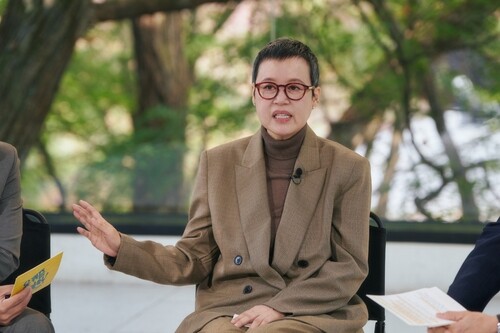BOK rate policy-full text
Full text of BOK statement on monetary policy decision in August
SEOUL, Aug. 24 (Yonhap) -- The following is the full text of the Bank of Korea's statement on its latest monetary policy decision.
The Monetary Policy Board of the Bank of Korea decided today to leave the Base Rate unchanged at 3.50 percent for the intermeeting period. Although inflation has slowed, it is forecast to pick up again to around the 3 percent level since August and to remain above the target level for a considerable time. In addition, uncertainties regarding economic conditions and monetary policy in major countries have risen. It is also necessary to closely monitor household debt trends. The Board, therefore, sees that it is appropriate to maintain its current restrictive policy stance. Regarding the need to raise the Base Rate further, the Board will make a judgement while assessing the changes in domestic and external policy conditions.
The currently available information suggests that global economic growth is projected to continue slowing due to the effects of elevated interest rates and a weakening recovery in the Chinese economy. Global inflation still remains high, though falling gradually, and the pace of the inflation slowdown has differentiated across countries. In global financial markets, government bond yields have risen and the U.S. dollar has strengthened due to prospects for a prolongation of the restrictive policy stance in major countries. Looking ahead, the Board sees global economic growth and global financial markets as likely to be affected by the movements of international commodity prices and the global inflation slowdown, monetary policy changes in major countries and their effects, and developments in the Chinese economy.
The improvement in domestic economic growth has somewhat moderated, with private consumption recovery slowing. Labor market conditions have been generally favorable, but the increase in the number of persons employed has been gradually decreasing due to the economic slowdown. Going forward, domestic economic growth is expected to improve gradually with a modest recovery in private consumption and the sluggishness in exports easing. GDP growth for this year is expected to be 1.4 percent, which is consistent with the May forecast. In the economic outlook, however, uncertainties regarding future growth in the Chinese economy and its domestic impacts, economic growth in major advanced countries, and the timing of a rebound in the IT industry are judged to be high.
Consumer price inflation has continued to moderate as expected, falling to 2.3 percent in July. This is mainly because the price of petroleum products has fallen substantially owing to the base effect from global oil prices, and the rise in the prices of personal services and processed food products has continued to slow. Both core inflation (excluding changes in food and energy prices from the CPI) and short-term inflation expectations among the general public have declined to 3.3 percent. Looking ahead, it is forecast that consumer price inflation will pick up again from August and fluctuate at around 3 percent until the end of the year. Consumer price inflation for the year is expected to be 3.5 percent, which is consistent with the May forecast. Meanwhile, core inflation is projected to maintain its modest slowdown. However, it is projected to be 3.4 percent for the year, which is slightly higher than the May forecast of 3.3 percent due to accumulated cost pressure. The inflation path is likely to be affected by changes in international commodity prices, weather conditions, and economic growth at home and abroad.
In financial and foreign exchange markets, the Korean won to U.S. dollar exchange rate has risen significantly due to prospects for a prolongation of the restrictive monetary policy stance in major countries and concerns about the economic slowdown in China. Long-term Korean Treasury bond yields have risen along with government bond yields in major countries. Meanwhile, the risks to some non-bank financial sectors have somewhat eased. Housing prices in Seoul and its surrounding areas have increased at a faster pace, while in the rest of the country the extent of the decline in housing prices has narrowed. The scale of the increase in household loans has expanded, mainly driven by housing-related loans.
The Board will continue to conduct monetary policy in order to stabilize consumer price inflation at the target level over the medium-term horizon as it monitors economic growth, while paying attention to financial stability. It is forecast that domestic economic growth will gradually improve, but inflation will remain above the target level for a considerable time. Moreover, uncertainties surrounding the policy decision are judged to be high. The Board, therefore, will maintain a restrictive policy stance for a considerable time with an emphasis on ensuring price stability, while making a judgement regarding the need to raise the Base Rate further. In this process, the Board will thoroughly assess the inflation slowdown, financial stability risks, economic downside risks, the effects of the Base Rate raises, monetary policy changes in major countries, and household debt growth.
(END)
(C) Yonhap News Agency. All Rights Reserved

















![[가요소식] 재주소년 콘서트 '예쁜 노래를 불러보자'](https://korean-vibe.com/news/data/20251113/yna1065624915925440_516.jpg)





